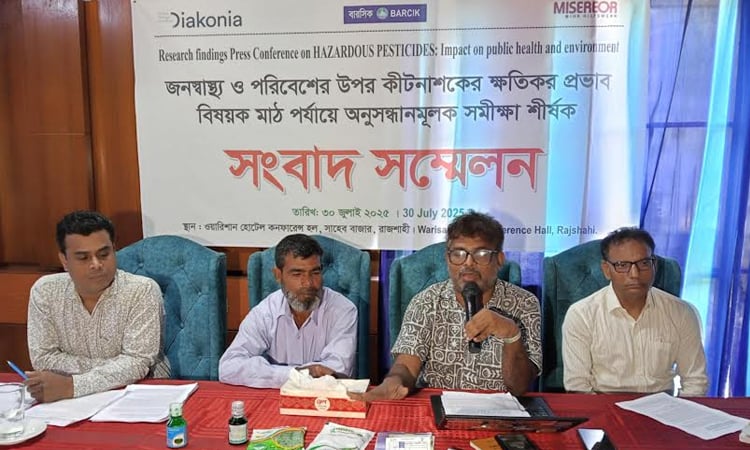News Flash
News Flash

RAJSHAHI, July 30, 2025 (BSS)- Widespread and often unregulated use of hazardous pesticides in agriculture is posing a serious threat to both public health and the environment in the region, particularly in the Barind area.
Experts and researchers made the observation while addressing a press conference titled "Hazardous Pesticides: Impact on Public Health and Environment", held at a city Hotel today.
Bangladesh Resource Centre for Indigenous Knowledge (BARCIK), a research-based development organization, organized the event to disseminate the findings of its recent field-level research on pesticide use and its consequences.
Speaking at the press conference, BARCIK Regional Coordinator Shahidul Islam said many grassroots-level farmers are frequently experiencing acute health problems such as sneezing, skin rashes, dizziness, and headaches during pesticide application.
"Long-term exposure to pesticides has been linked to chronic health conditions, including cancer, endocrine disruption, neurodegenerative diseases, and reproductive issues," he said.
He added that pesticide residues in food-especially vegetables-pose significant risks to consumers, as many farmers do not follow the recommended withdrawal periods before harvesting. Children and pregnant women are particularly vulnerable due to the bioaccumulative nature of these chemicals, he added.
BARCIK Director Pavel Partha, who led the research, said pesticide runoff is contaminating surface and groundwater, thereby impacting drinking water sources and aquatic ecosystems. He also warned that persistent pesticide presence in soil is affecting soil health and hampering plant growth.
"Pesticides often kill non-target organisms, leading to disruptions in the delicate balance of ecosystems," he said.
Referring to the Barind region, a major agricultural zone in Rajshahi, he noted a decline in groundwater levels due to excessive irrigation, which is further exacerbated by chemical inputs like pesticides. Crops such as beans and eggplants are particularly prone to pesticide overuse in this area, he added.
Partha stressed the importance of raising awareness among farmers about the risks of pesticide misuse and promoting safe handling practices. He called for stricter enforcement of regulations concerning pesticide application and withdrawal periods.
He also emphasized the need for promoting integrated pest management (IPM) and other eco-friendly farming practices to reduce reliance on hazardous pesticides.
"Regular monitoring of pesticide levels in food, water, and soil, alongside further research on long-term health impacts, is essential," Partha said.
Highlighting a major concern, he revealed that many banned pesticides are still available in local markets, often sold under new names. "Farmers and even pesticide dealers are often unaware that they are using or selling banned substances," he added.